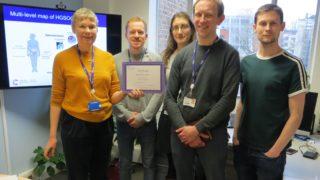Tag: Ovarian
Search News
Categories
Archives
NHS Innovation Accelerator
5th March 2019
Dr Ranjit Manchanda from Barts Cancer Institute, Queen Mary University of London, and Consultant Gynaecological Oncologist at Barts Health NHS Trust, was announced today as one of 13 Fellows to join the NHS […]
Read moreResearch suggests improved detection rates are needed to maximise cancer prevention
8th June 2018
Current detection strategies are found to have identified only 2.6% of the BRCA gene mutation carriers in the Greater London population, according to a recent study published in the Journal of Medical genetics. The findings of the study, performed by researchers from the BCI’s Centre for Experimental Cancer Medicine, led by Dr Ranjit Manchanda, suggest that enhanced and new approaches are required to maximise the opportunity for breast and ovarian cancer prevention.
Read moreDr Ranjit Manchanda awarded William Blair Bell Memorial Lecture
9th March 2018
Congratulations to our Dr Ranjit Manchanda, Centre for Experimental Cancer Medicine, who has been awarded the William Blair Bell Memorial Lecture prize. Dr Ranjit Manchanda was awarded with the prize on 8th February and presented his lecture, entitled ‘Population based germline testing and targeted ovarian cancer prevention,’ the following day.
Read moreThe involvement of the microenvironment in tumour evolution
15th February 2018
For the first time, researchers at the Barts Cancer Institute (BCI), Queen Mary University of London, have profiled what happens at the site of tumour metastasis as cancer grows and develops. By looking closely at the tumour microenvironment (TME), the team led by Professor Fran Balkwill, Lead for the Centre for Cancer & Inflammation, has identified changes that occur as a type of ovarian cancer evolves.
Read moreCost-effective testing for breast and ovarian cancer gene mutations
18th January 2018
Screening the entire population for breast and ovarian cancer gene mutations, as opposed to just those at high-risk of carrying this mutation, is cost effective and could prevent more ovarian and breast cancers than the current approach, according to research led by Barts Cancer Institute of Queen Mary University of London. The researchers believe that implementing a programme to test all British women over 30 years of age could result in thousands of fewer cases of ovarian and breast cancer; up to 17,000 fewer ovarian cancers and 64,000 fewer breast cancers over a lifetime.
Read more



